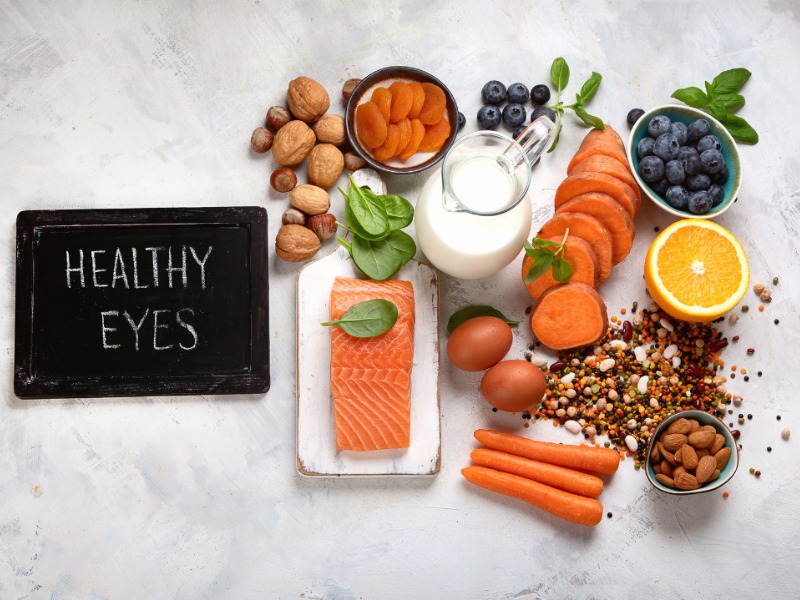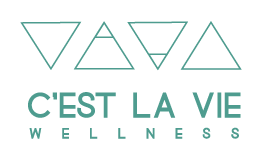Eye Health – Part 2: Top 5 Nutrients for Healthy Eyes

by Lyne Desforges
Registered Holistic Nutritionist & Culinary Nutrition Expert
Healthy Eyes
There are many conditions that can affect your eyes including cataracts, glaucoma, macular degeneration, computer vision syndrome, retinopathy (diabetic eye disease), rhinitis, and general vision loss. The chances of developing these conditions will depend on many factors including your age, your genes, your overall health, your nutrition, and your lifestyle.
In our blog Eye Health – Part 1: Computer Vision Syndrome, we delved into all the side-effects of too much screen time. It is practically impossible to be digital-free in this day and age, however there is much we can control.
Diet and lifestyle are always important when it comes to overall health and that goes for your eyes as well. Try to include as many of these important nutrients in your diet to counter the effects of too much screen time.
Top 5 Nutrients for Eye Health
-
Beta-Carotene & Vitamin A
Beta-carotene is the main source of vitamin A found in many fruits and vegetables. Once ingested, the body will convert the beta-carotene into Vitamin A. Vitamin A is important for overall vision and for the cornea, that thin layer covering the eye. A deficiency in this vitamin has been associated with night blindness and dry eyes.
Best food sources of Beta-Carotene: sweet potatoes, carrots, red bell peppers, squash, leafy greens, dried apricots, mangos, cantaloupe, peas, and broccoli.
Best Food sources of Vitamin A: fish liver oils, liver, egg yolks, butter, and vitamin A–fortified dairy products.
Note: if taking vitamin A supplements, ingest with fat for better absorption because it is a fat-soluble vitamin. -
Vitamin C
This vitamin is important for the health of our blood vessels including the capillaries of the eyes. It helps with the formation of connective tissues including the collagen found in the eye’s cornea. Because it is high in antioxidants, vitamin C can help reduce the effect of free radicals on the eyes. Studies have shown a positive effect of vitamin C and the reduced risk of cataracts.
Foods high in Vitamin C: bell peppers, guava, berries, kale (and other leafy greens), citrus fruits, kiwi, broccoli (and other cruciferous vegetables), mango, pineapple, and papaya. -
Lutein & Zeaxanthin
These two carotenoids are essential to eye health. Lutein and zeaxanthin are the main pigments found in the yellow part of the retina. It helps improve vision and protect the eyes from damage by blue light. Because of their high content in antioxidants, lutein and zeaxanthin help reduce eye damage from free radicals. Studies have shown a strong link with a decrease in age-related macular degeneration and cataracts as well.
Foods high in lutein & zeaxanthin: leafy greens, green peas, zucchini, pumpkin, pistachios, egg yolks, corn, durum wheat, carrots, yellow/orange bell peppers, cantaloupe, salmon & other fish.
Note: if supplementing with lutein & zeaxanthin, ingest with a fat source for better absorption. -
Omega-3 Fatty Acids
One particular Omega 3, DHA, has shown a lot of promise regarding eye health and may be crucial in preventing age-related vision loss. Although much research is still ongoing regarding this, we know that very high levels of DHA are present in the retina. It is also very important for brain and eye development in infants and young children. There is also good evidence that supplementing with Omega 3s may help with dry eye symptoms.
Foods high in Omega-3 Fatty Acids: cold-water fatty fish, such as salmon, mackerel, tuna, herring, and sardines, nuts and seeds (especially flaxseeds and walnuts), and seed oils. -
Zinc:
Zinc is a trace mineral that is an integral part of proper eye function. High levels of zinc are found in the retina. Zinc has an important role to play in bringing vitamin A from the liver to the retina in order to produce melanin, a pigment that helps protect against UV radiation. Zinc deficiency has been linked to impaired vision, such as poor night vision and cloudy cataracts. There is conflicting evidence regarding zinc and age-related macular degeneration. More studies are needed for any conclusive evidence. Finally, because it is a powerful antioxidant, zinc can help reduce free radicals that could damage the eyes.
Foods high in zinc: oysters and other seafood, red meat, poultry, beans, nuts & seeds.
Just Eat Clean Whole Foods
By following a diet that is rich in fruits & vegetables, healthy fats, and well-sourced protein, you will ensure you provide good nourishment for your eyes. Bright colourful fruits and vegetables are usually high in the key nutrients so make sure to add those to your plate regularly. Adding lots of foods high in antioxidants, will also help.
Stay Hydrated
Staying well hydrated is crucial for overall health and wellbeing and that goes for your eyes as well. In a state of dehydration, your body can can no longer produce tears or keep your eyes lubricated. This may lead to dry eyes, general eye strain, blurry vision, eye fatigue, and headaches. How much water should you drink? Well that depends on many factors including age, climate, activity level, genetics, overall diet. According to the Academies of Sciences, Engeneering & Medicine, women who appear to be adequately hydrated consume an average of approximately 2.7 liters (91 ounces) of total water — from all beverages and foods — each day, and men average approximately 3.7 liters (125 ounces) daily.
Supplements
If you need that extra boost to help your eyes stay healthy, you can get supplements geared specifically to eye health that will contain all or part of these nutrients. At the C’est La Vie Wellness clinic, we carry two different supplements by Cyto-Matrix that you may wish to consider. Bio-lutein is specifically designed to protect the eyes from the damaging effects of blue lights from electronics, while Eye Matrix is good for general overall eye health. Remember to always consult with your healthcare practitioner before using any supplements.
Lifestyle Tips
Nutrition is only part of the equation when it comes to eye health and screen time. Adopting a few changes in your work routine may go a long way to reduce eye strain and dry eyes. To find out more, read our last blog on Eye Health – Part 3: 10 Lifestyle Tips for Healthy Eyes.

Educating, motivating and inspiring have always been important aspects of my professional journey. Through workshops, cooking classes, customized menus & recipe books, and online programs, I guide clients towards healthier food choices and eating habits.
